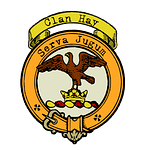Welcome back to "A Clan A Day Podcast." I’m your host, Colin MacDonald, and today we’re diving into the history of Clan Buchanan, a proud and storied Highland clan with roots that stretch deep into the history of Scotland, and possibly even beyond.
The origins of Clan Buchanan are shrouded in myth and legend, with the traditional story tracing the lineage back to Anselan O'Kyan, a prince of Ulster, who is said to have fled to Scotland around the year 1016 to escape the invading Danes. According to legend, Anselan offered his services to King Malcolm II, assisting in battles against the Danes. As a reward for his loyalty and martial prowess, Malcolm II granted him lands in what would later become the Buchanan territories along the eastern shore of Loch Lomond. However, modern research and DNA analysis suggest that Clan Buchanan might actually have a much older Scottish origin, with no direct ties to Ireland. Regardless of the true origin, Anselan’s story has long been cherished as a key part of Buchanan identity.
The clan's name, Buchanan, is believed to have been derived from the Gaelic "Buth Chanain," meaning "House of the Canon," possibly indicating a religious origin or a connection to the early Christian church in Scotland. The Buchanans settled in the area now known as Stirlingshire, with their lands eventually extending across the east side of Loch Lomond, encompassing some of the most beautiful stretches of Scottish countryside.
The earliest confirmed chief of Clan Buchanan was Gillebrid, who was active around 1240. Gillebrid was the seneschal to the Earl of Lennox, a prestigious position that helped to solidify the clan’s power in the region. Under his leadership, the clan began to grow in influence, and by 1282, Maurice de Buchanan, a later chief, had secured a charter from the Earl of Lennox for the lands of Buchanan, establishing the clan as a significant force in the region.
The Buchanans were known for their fierce loyalty and martial prowess. During the Wars of Scottish Independence, the clan supported Robert the Bruce, with Maurice, the chief at the time, famously refusing to sign the Ragman Roll, which was a pledge of allegiance to Edward I of England. The Buchanans' loyalty to Bruce was rewarded, and the clan's reputation as staunch defenders of Scottish independence was cemented.
One of the most famous tales in Buchanan history is that of the "King of Kippen." John Buchanan, the laird of Arnprior and a member of the clan, famously declared himself the "King of Kippen" after seizing a royal shipment of venison intended for King James V. When the king, disguised as a commoner, arrived at Buchanan's door demanding entry, the laird’s porter initially refused him, saying the laird was dining and could not be disturbed. Upon realizing that the "Goodman of Ballengeich" was in fact the king, John Buchanan hastily welcomed him in, and the king, amused by Buchanan's audacity, dined with him. From that day, John Buchanan was known as the "King of Kippen," a title that stuck as a testament to the clan's boldness and wit.
The Buchanans also played a role in the turbulent politics of the 17th century. During the Wars of the Three Kingdoms, Sir George Buchanan, the 21st Chief, led the Stirlingshire Regiment on behalf of the Covenanters, who were fighting for religious and political reform. Unfortunately, he was captured at the Battle of Inverkeithing and died in captivity in 1651. His death marked the beginning of a decline for the clan, as financial difficulties forced the sale of the Buchanan estates to the Marquess of Montrose.
The last recognized chief of the Buchanan clan was John Buchanan, who died in 1681 without a male heir. This resulted in the chiefship becoming dormant for over 300 years. However, after extensive genealogical research, the Lord Lyon King of Arms recognized John Michael Baillie-Hamilton Buchanan as the new chief in 2018, reviving a proud tradition and bringing new leadership to the clan after centuries of uncertainty.
Clan Buchanan’s cultural contributions are also notable. Perhaps the most famous Buchanan was George Buchanan, a renowned humanist scholar, historian, and tutor to King James VI of Scotland. His works, particularly his "History of Scotland," and his Latin translations of the Psalms, were highly influential in the intellectual circles of his time and helped shape the education of the future king.
Today, Clan Buchanan remains a symbol of resilience, loyalty, and cultural pride. The Clan Buchanan Society, one of the oldest clan societies in Scotland, continues to preserve and celebrate the history and traditions of the clan. The acquisition of Clairinch, an island in Loch Lomond that once served as the clan's rallying point, by a modern Buchanan clansman who gifted it to the Clan Society, is a testament to the enduring spirit of the Buchanans.
Thank you for joining us on this exploration of Clan Buchanan's history. From ancient legends to modern-day achievements, the story of the Buchanans is one of continuity, adaptation, and pride. Be sure to tune in tomorrow for another episode of "A Clan A Day Podcast." I'm Colin MacDonald, and as always, Go n-éirí an bóthar leat.













Share this post